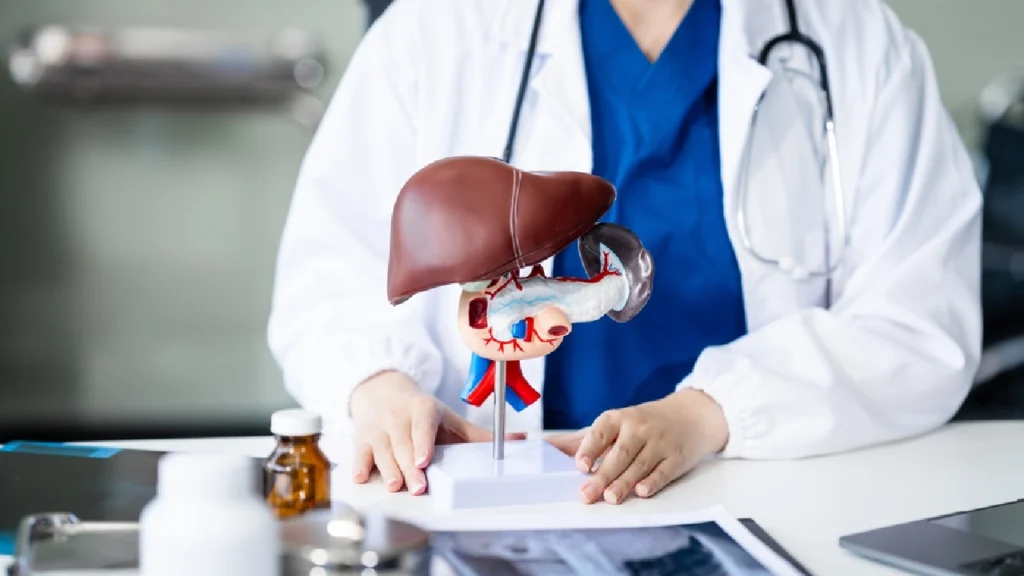What is a Liver Transplant?
Here is a comprehensive overview of Liver Transplantation, covering its purpose, process, costs, and key considerations.
A liver transplant is a major surgical procedure to remove a diseased or failing liver and replace it with a healthy whole or partial liver from another person (a donor). It is typically a life-saving treatment for patients with end-stage liver failure for whom all other treatment options have been exhausted.

When is a Liver Transplant Needed? (Indications)
A transplant is considered when the liver permanently loses its ability to function (end-stage liver disease). Common causes include:
- Cirrhosis: Scarring of the liver from long-term damage. This is the most common reason.
- Alcoholic Liver Disease: From long-term excessive alcohol use.
- Non-Alcoholic Fatty Liver Disease (NAFLD) / NASH: Fat buildup in the liver causing inflammation and scarring.
- Chronic Viral Hepatitis: Primarily Hepatitis B and Hepatitis C.
- Autoimmune Hepatitis: The body’s immune system attacks the liver.
- Acute Liver Failure (Fulminant Hepatic Failure): Sudden loss of liver function in a person with no pre-existing liver disease, often due to:
- Viral Hepatitis (Hep A, B, E)
- Drug-Induced Liver Injury (e.g., acetaminophen/paracetamol overdose, certain medications)
- Toxins (e.g., poisonous mushrooms)
- Liver Cancers:
- Hepatocellular Carcinoma (HCC): The most common primary liver cancer. A transplant can cure the cancer and the underlying liver disease simultaneously.
- Other rare liver cancers like hepatoblastoma or cholangiocarcinoma (in select cases).
- Genetic / Metabolic Diseases:
- Hemochromatosis (iron overload)
- Wilson’s Disease (copper overload)
- Alpha-1 Antitrypsin Deficiency
Types of Liver Donors
- Deceased Donor (Cadaveric) Transplant:
- The liver comes from a person who has been declared brain dead.
- Recipients are placed on a national waiting list. Allocation is based on the MELD score (Model for End-Stage Liver Disease) or PELD score (for children), which objectively measures the severity of liver disease and prioritizes the sickest patients.
- Living Donor Transplant:
- A healthy living person donates a portion of their liver. The human liver has a remarkable ability to regenerate. Both the donated segment and the remaining part of the donor’s liver will grow back to near-full size within a few months.
- Advantages: Can be scheduled electively, avoids a long wait, and often results in better outcomes due to shorter preservation time and a healthier organ.
- Donors are typically close family members (parents, siblings, adult children) or emotionally connected individuals (e.g., a spouse). They undergo an exhaustive physical and psychological evaluation to ensure they are a match and can donate safely.
The Liver Transplant Process
- Evaluation: A rigorous multi-day process involving a team of hepatologists, transplant surgeons, psychiatrists, nutritionists, and social workers. Tests include:
- Blood tests (blood type, tissue typing, viral screens)
- Imaging (CT scan, MRI, ultrasound) to assess liver size and blood vessels
- Heart, lung, and kidney function tests
- Cancer screening
- Nutritional and psychological assessment
- Waiting List: If approved, the patient is placed on the national waiting list for a deceased donor organ. The wait can be long and unpredictable.
- The Surgery:
- A complex operation that can take 6-12 hours.
- The diseased liver is carefully removed.
- The donor liver (or lobe) is placed and connected to the patient’s blood vessels and bile ducts.
- Recovery (ICU and Hospital Stay):
- Several days in the ICU for close monitoring.
- Total hospital stay is typically 2-3 weeks.
- Patients start taking immunosuppressant drugs immediately to prevent rejection.
- Lifelong Follow-up:
- Regular blood tests and check-ups to monitor liver function and adjust medication.
- Strict adherence to immunosuppressants is mandatory for life.
- Managing side effects of medications (increased risk of infections, diabetes, high blood pressure, kidney problems).
Cost of Liver Transplant in India
India is a global hub for liver transplants due to its high success rates and significantly lower costs compared to Western countries.
- Estimated Cost Range: ₹20,00,000 to ₹35,00,000 (approx. $25,000 to $42,000 USD)
What influences the cost?
- Type of Hospital: Premium private hospitals in metros (Delhi, Mumbai, Chennai, Bangalore) charge more.
- Surgeon’s Fee: Experience and reputation of the surgical team.
- Type of Transplant: Living donor transplants are generally more expensive than deceased donor transplants due to two simultaneous surgeries (donor and recipient).
- Patient’s Condition: Complications, co-existing illnesses, and longer ICU stays increase cost.
- Medications: The cost of lifelong immunosuppressants is a significant long-term expense (~₹15,000 – ₹30,000 per month initially, reducing over time).
- Pre- and Post-Transplant Care: Includes evaluation, follow-up tests, and consultations.
Success Rates: In leading Indian centers, the success rate for liver transplants is very high, with 1-year survival rates exceeding 90% and 5-year survival rates around 80-85%.
Risks and Challenges
- Surgical Risks: Bleeding, infection, blood clots.
- Rejection: The immune system attacks the new liver. Managed with immunosuppressants.
- Primary Non-Function: The new liver fails to work immediately.
- Bile Duct Complications: Leakage or narrowing of the bile ducts.
- Infections: Due to suppressed immunity from anti-rejection drugs.
- Recurrence of Disease: The original disease (e.g., Hepatitis C, NASH, cancer) can sometimes recur in the new liver.
- Long-term medication side effects.
Liver Transplant Cost in India
India is globally renowned for providing high-quality liver transplant services at a fraction of the cost compared to Western countries.
- Estimated Cost Range: ₹20,00,000 to ₹35,00,000 (approx. $25,000 to $42,000 USD)
What does this cost typically include?
- Pre-transplant evaluation and tests for the recipient.
- Donor workup (for living donor transplants).
- Hospitalization and ICU stay.
- Surgeon, anaesthetist, and consultant fees.
- Operation theatre charges.
- Immunosuppressant medication during the hospital stay.
- The cost of the organ retrieval and regulatory paperwork.
Factors that significantly influence the cost:
- Type of Transplant: A Living Donor Liver Transplant (LDLT) is generally more expensive than a Deceased Donor Transplant (DDLT) because it involves two simultaneous complex surgeries (donor and recipient).
- Hospital Category: Premium corporate hospitals in metros will be at the higher end of the spectrum, while some well-known centers in other cities might offer more economical packages.
- Patient’s Condition: Complications, infections, or a longer stay in the ICU will increase the overall cost.
- Surgeon’s Experience: The fee of a highly renowned and experienced transplant surgeon will be higher.
- Post-Transplant Care: The biggest long-term cost is lifelong immunosuppressant medication, which can cost ₹15,000 – ₹30,000 per month initially and may reduce slightly over time.
- City: Costs in Delhi, Mumbai, and Chennai are typically higher than in other cities.
Best Hospitals for Liver Transplant in India
Selecting the “best” hospital depends on individual needs, the complexity of the case, and the experience of the team. The following hospitals are consistently ranked at the top due to their high volumes, excellent outcomes, experienced teams, and state-of-the-art infrastructure.
They are pioneers in the field and have performed thousands of successful transplants.
- Apollo Hospitals, Chennai
- Why it’s top-tier: Home to one of the most experienced liver transplant programs in Asia. Dr. Subash Gupta, a world-renowned pioneer in living donor transplantation, leads the team. The hospital has an immense volume of cases and exceptional success rates.
- Key Highlights: Extremely robust team for complex cases, including combined liver-kidney transplants and re-transplants.
- Medanta – The Medicity, Gurugram
- Why it’s top-tier: Led by Dr. Arun Sachdev and Dr. Vijay Vohra, the Liver Institute at Medanta is a center of excellence. They are known for technical expertise, cutting-edge technology (including robotics), and managing high-risk patients.
- Key Highlights: High success rates, excellent ICU management, and a comprehensive multi-organ transplant program.
- Global Hospitals, Mumbai & Chennai
- Why it’s top-tier: A dedicated focus on multi-organ transplantation. The late Dr. Mohamed Rela (based in Chennai) is an international icon in liver transplantation, especially in pediatric transplants. The Mumbai unit is also highly advanced.
- Key Highlights: World-record holders for successful liver transplants. Particularly renowned for groundbreaking work in pediatric liver transplants and using reduced-size livers.
- Institute of Liver and Biliary Sciences (ILBS), New Delhi
- Why it’s top-tier: A premier government-funded dedicated liver institute. It offers highly subsidized treatment for eligible patients and is a center for research and education.
- Key Highlights: Unmatched expertise in liver diseases, extremely cost-effective for those who qualify, and one of the highest volumes of liver transplants in the country.
- Fortis Memorial Research Institute (FMRI), Gurugram
- Why it’s top-tier: Has a strong, well-established liver transplant program with excellent outcomes. The team is experienced in both adult and pediatric living donor transplants.
- Key Highlights: Advanced infrastructure, skilled multi-disciplinary team, and good patient support systems.
- Kokilaben Dhirubhai Ambani Hospital, Mumbai
- Why it’s top-tier: Known for its advanced technology and high standard of care. Has a robust team that handles a large number of complex liver resections and transplants.
- Key Highlights: 24/7 specialist coverage, strong ICU, and good outcomes for deceased donor transplants.
- Sir Ganga Ram Hospital, New Delhi
Conclusion
A liver transplant is a formidable yet life-saving procedure for those with no other options. It involves a lifelong commitment to medical care but offers a chance to return to a normal, healthy life. The decision to undergo a transplant requires careful evaluation by a dedicated multidisciplinary team and a strong support system for the patient.


